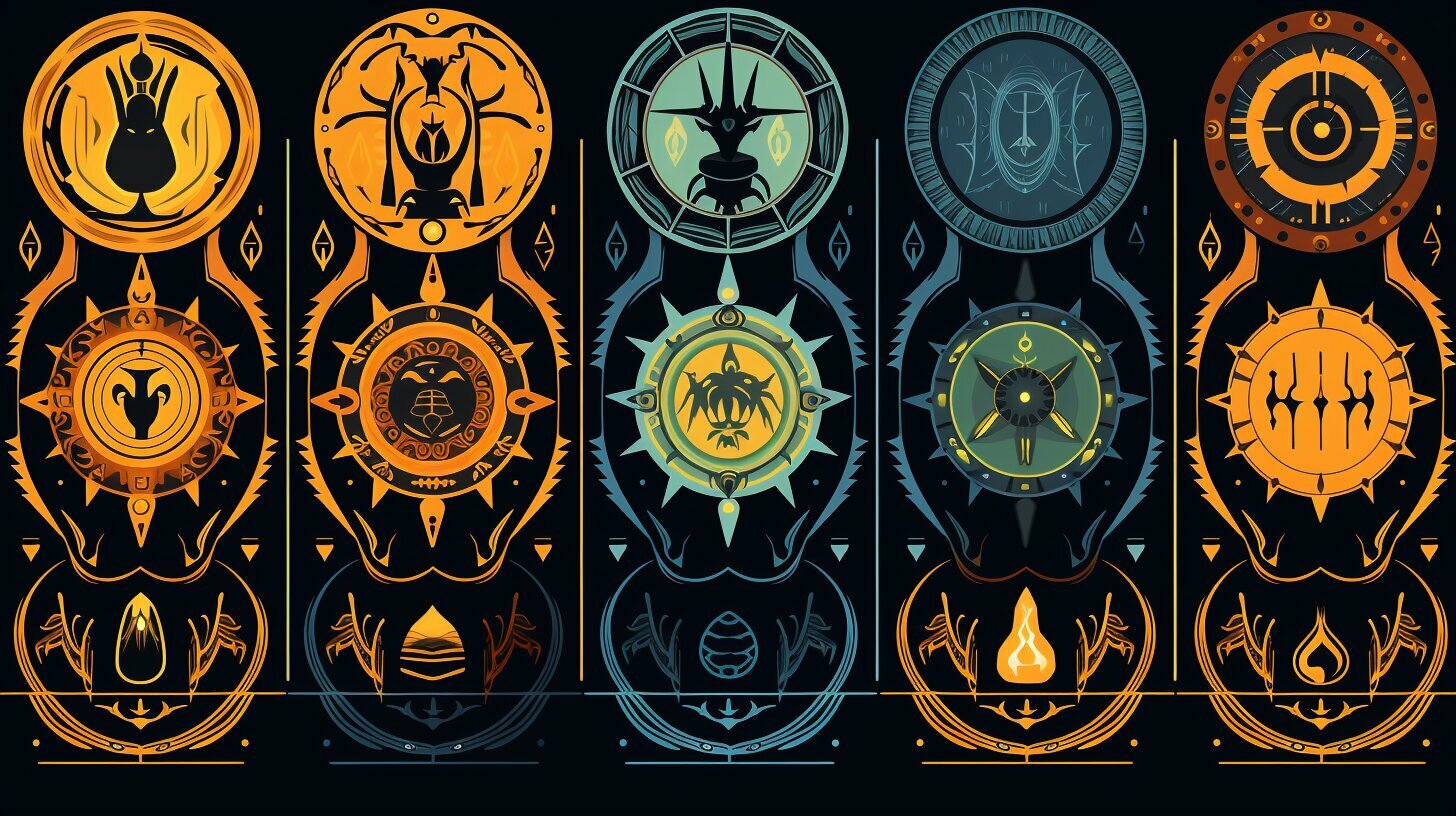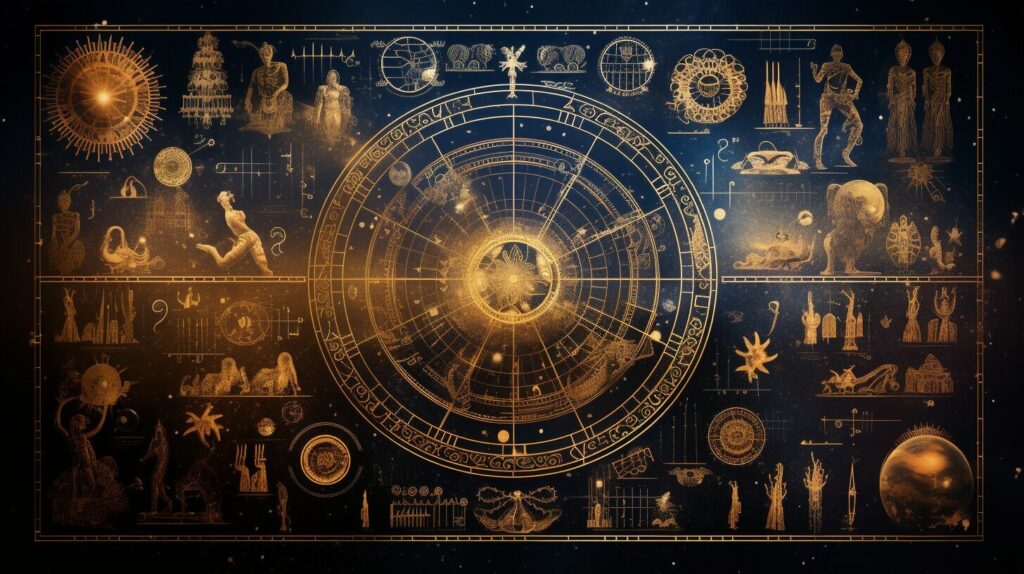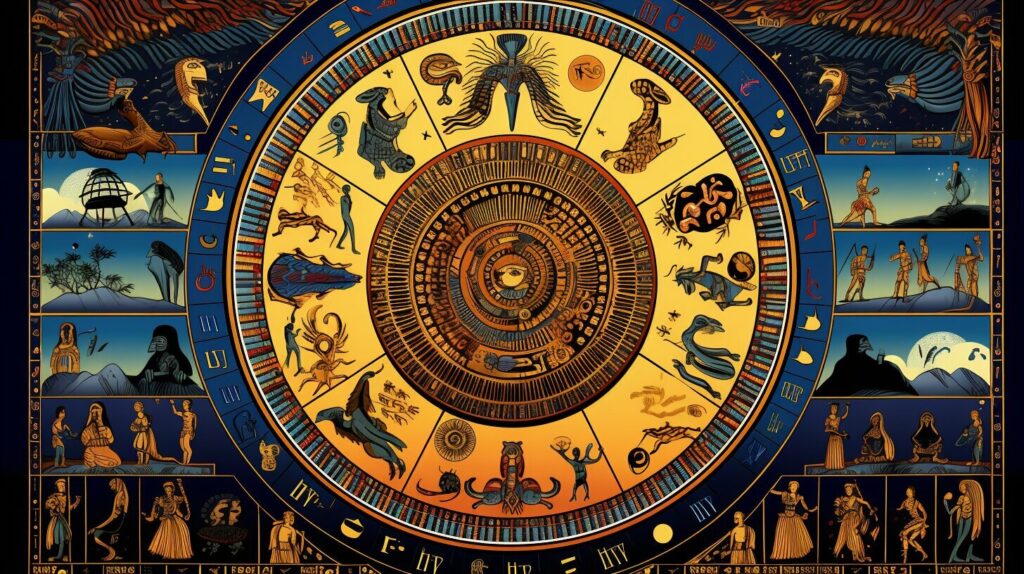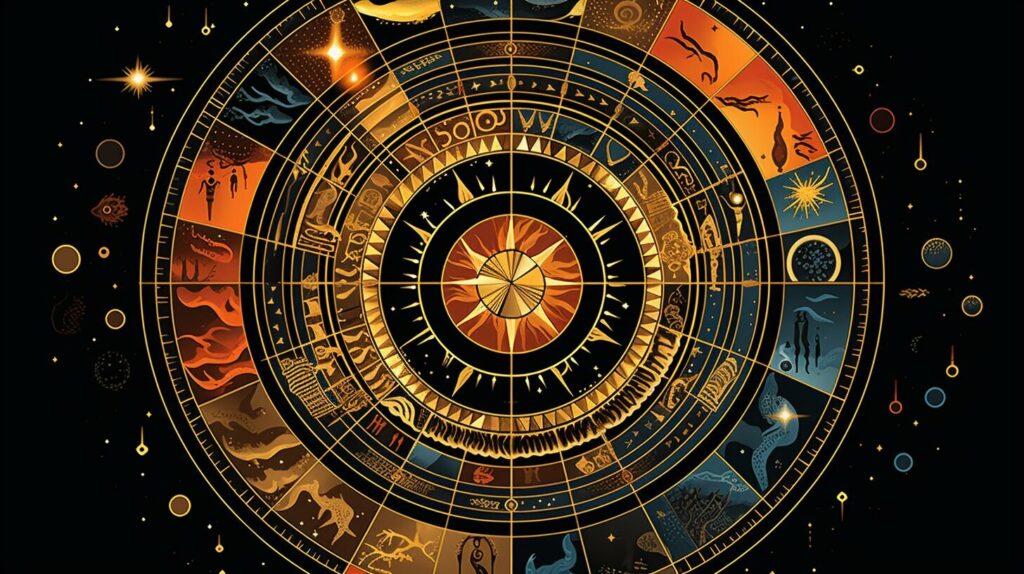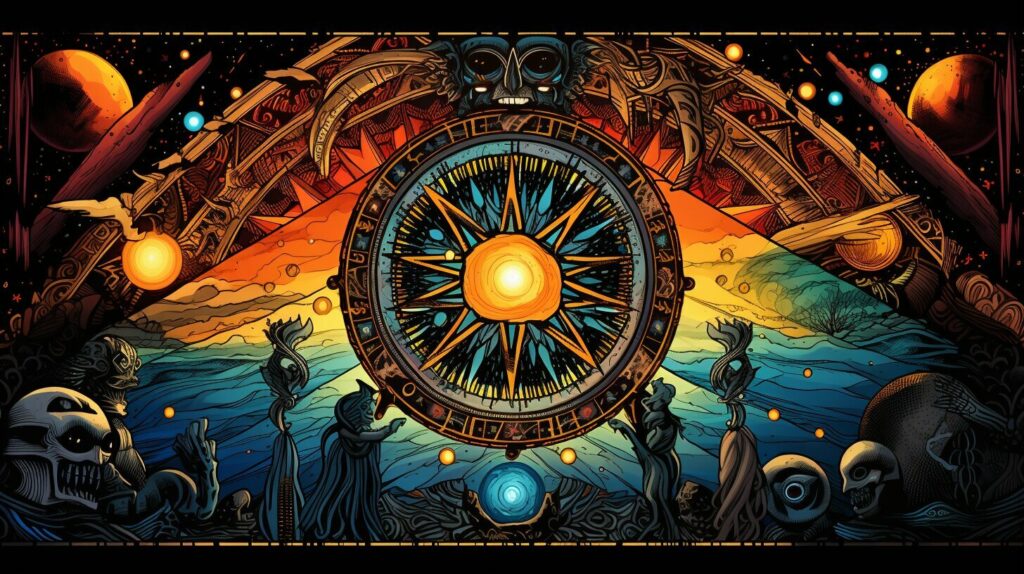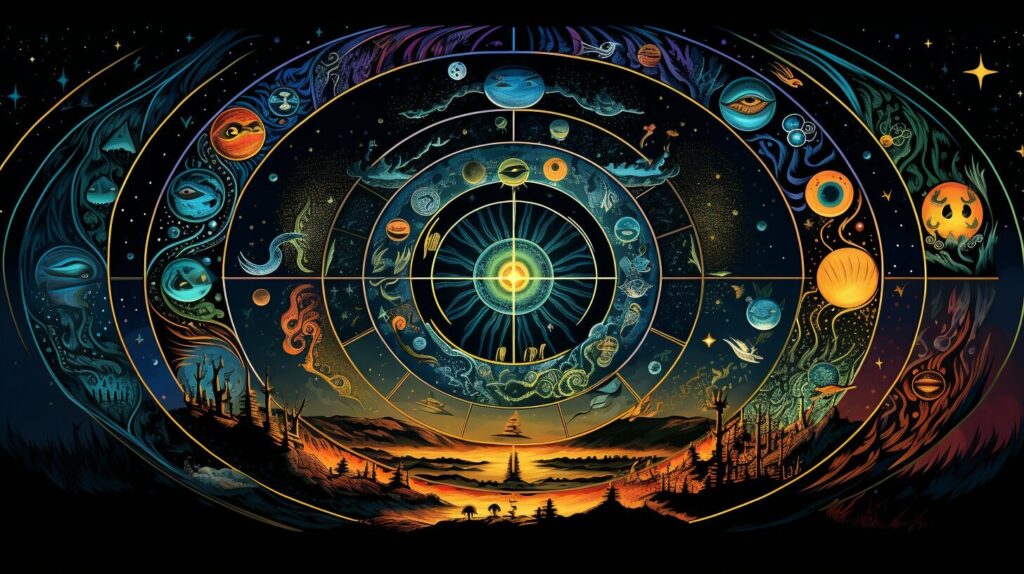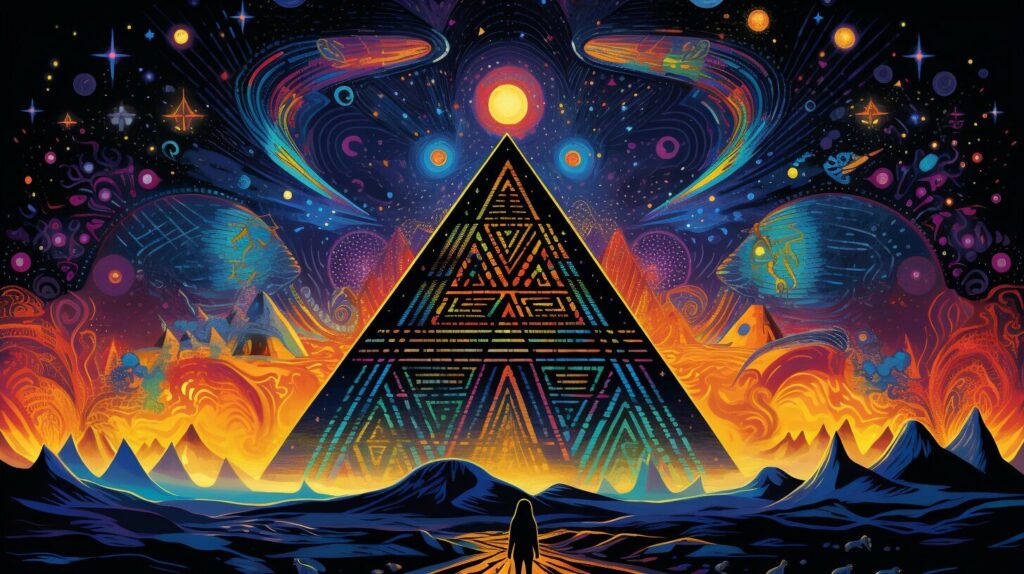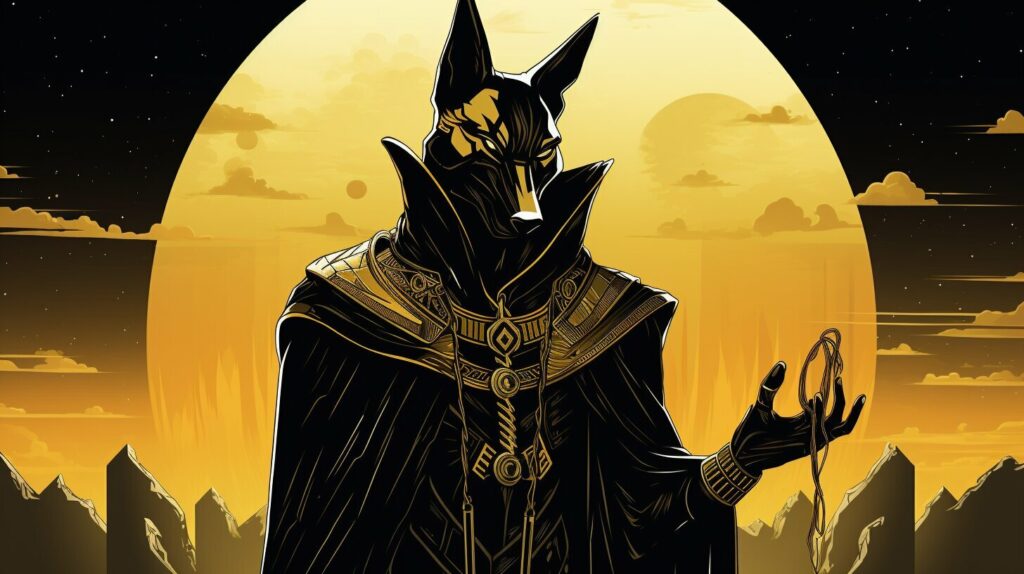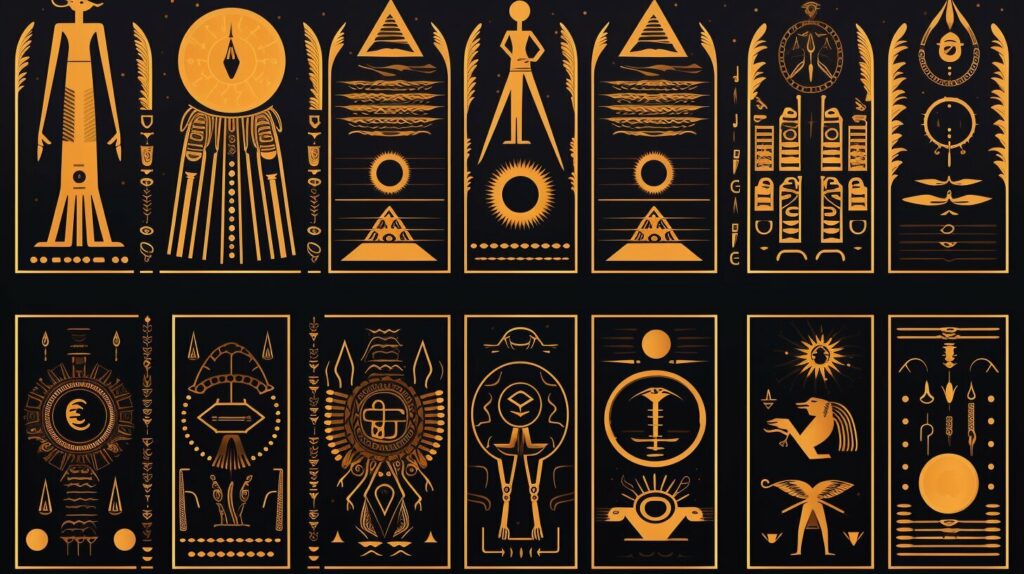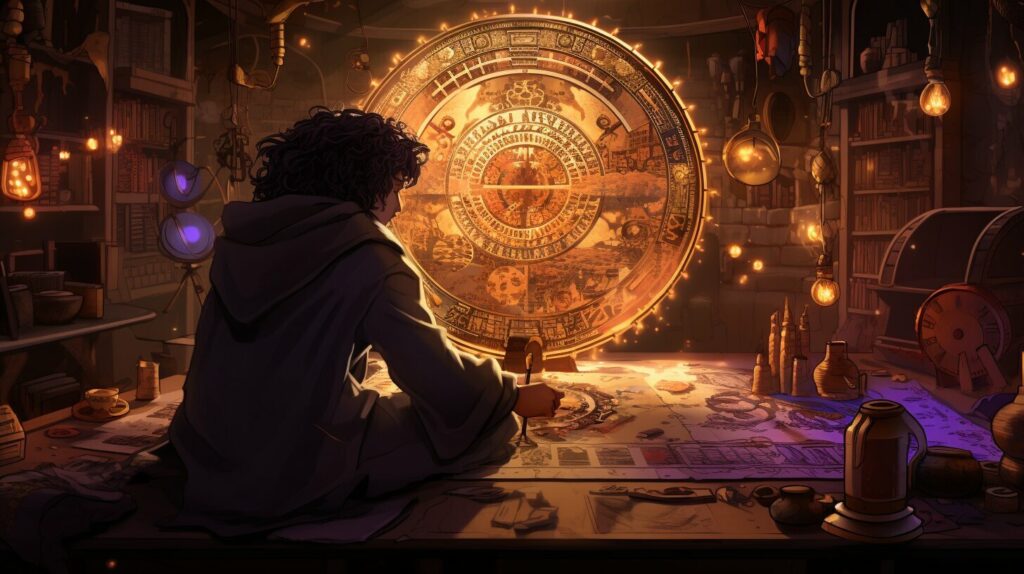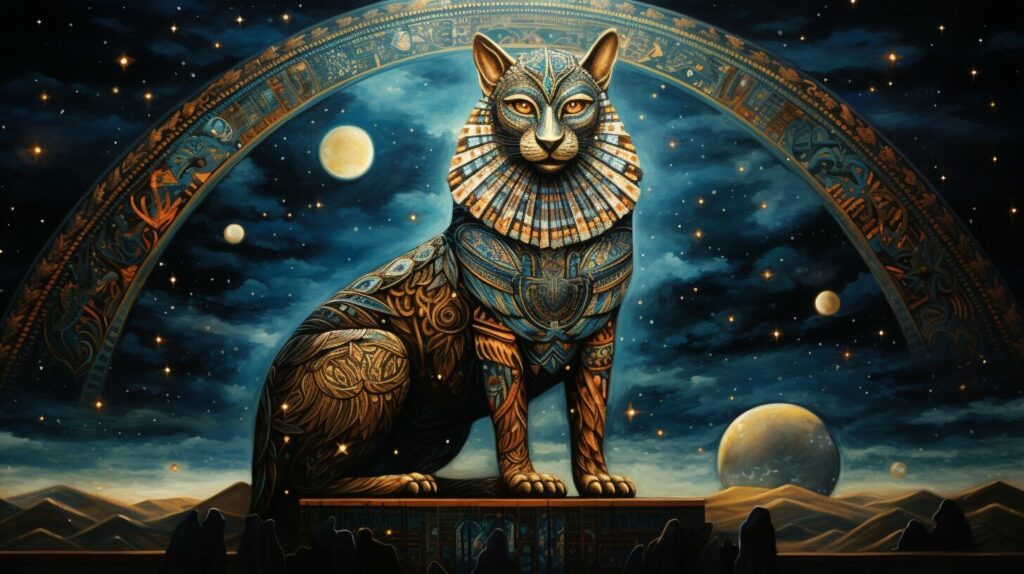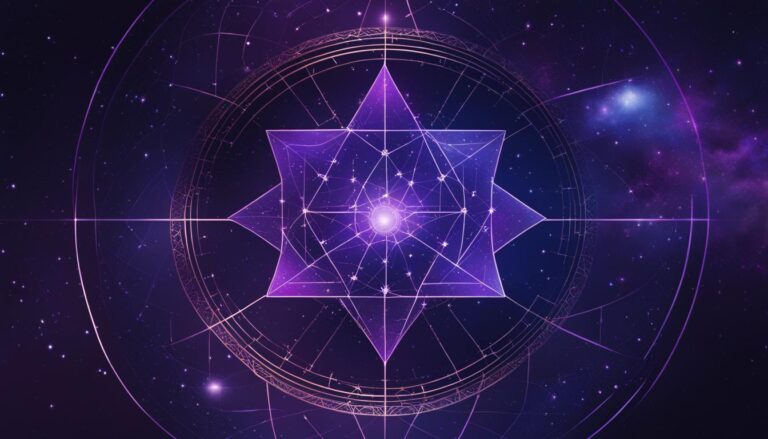Intrigued by the mysteries of the stars and the ancient wisdom of astrology? Look no further than the captivating world of Egyptian astrology. In this article, I will guide you through the fascinating realm of ancient Egyptian astrology, exploring its rich history, complex symbolism, and powerful insights into human nature.
Whether you are a seasoned astrology enthusiast or a curious newcomer, Egyptian astrology is sure to captivate your imagination and open your mind to new possibilities. From the twelve mesmerizing Egyptian zodiac signs to the intricate details of the Egyptian astrology chart, there is no shortage of fascinating discoveries to be made.
Join me on a journey through time and space as we unlock the secrets of Egyptian astrology and discover the hidden wisdom of this ancient system.
Key Takeaways:
- Egyptian astrology offers unique insights into human nature and our connection to the cosmos.
- The Egyptian zodiac signs are associated with specific symbols and deities, each with their own personality traits and characteristics.
- Interpreting your Egyptian horoscope based on your birth date and zodiac sign can provide insights into your strengths, weaknesses, and potential life path.
- The Egyptian astrology chart combines elements from astronomy, numerology, and mythology to create a complex and intricate system of symbolism.
- Exploring the role of Egyptian astrology in personal growth, relationships, and daily life can help us better understand ourselves and our place in the world.
The Origins of Egyptian Astrology
As I delve into the world of Egyptian astrology, it’s important to understand its origins. Ancient Egyptians were fascinated with celestial movements and incorporated them into their daily lives, creating a unique astrological system that differs from others.
The earliest known traces of Egyptian astrology can be traced back to the 3rd millennium BCE. It evolved over time as the Egyptians gained greater knowledge of the stars and planets. By the time of the Greco-Roman period, Egyptian astrology had already developed its core principles and characteristics.
Unlike Western astrology, which focuses on the twelve zodiac signs of the year, Egyptian astrology is based on the stars in the sky at the time of a person’s birth. The signs are represented by animals, gods, and natural elements, each with their own symbolism and significance.
The ancient Egyptians believed that the position of the stars at the time of a person’s birth could reveal information about their personality, strengths, and weaknesses. It was also used for predicting the future and making important decisions.
Overall, Egyptian astrology is a fascinating system that reflects the ancient Egyptians’ dedication to understanding the universe around them. Its unique characteristics and symbolism still captivate and inspire people today, making it a rich area for exploration and personal growth.
The Egyptian Zodiac Signs
One of the most captivating aspects of Egyptian Astrology is its twelve zodiac signs, each associated with a specific symbol and deity. The ancient Egyptians believed that these symbols had a profound influence on a person’s personality, fate, and destiny.
The twelve Egyptian zodiac signs are represented by animals, such as the falcon, the crocodile, and the cat, as well as by gods and goddesses, such as Osiris, Isis, and Anubis. Each sign has its unique set of personality traits and characteristics, based on the symbolism associated with the animal or deity.
| Zodiac Sign | Date Range | Symbol |
|---|---|---|
| The Nile | Jan 1 – Jan 7, Jun 19 – Jun 28, Sep 1 – Sep 7, Nov 18 – Nov 26 | 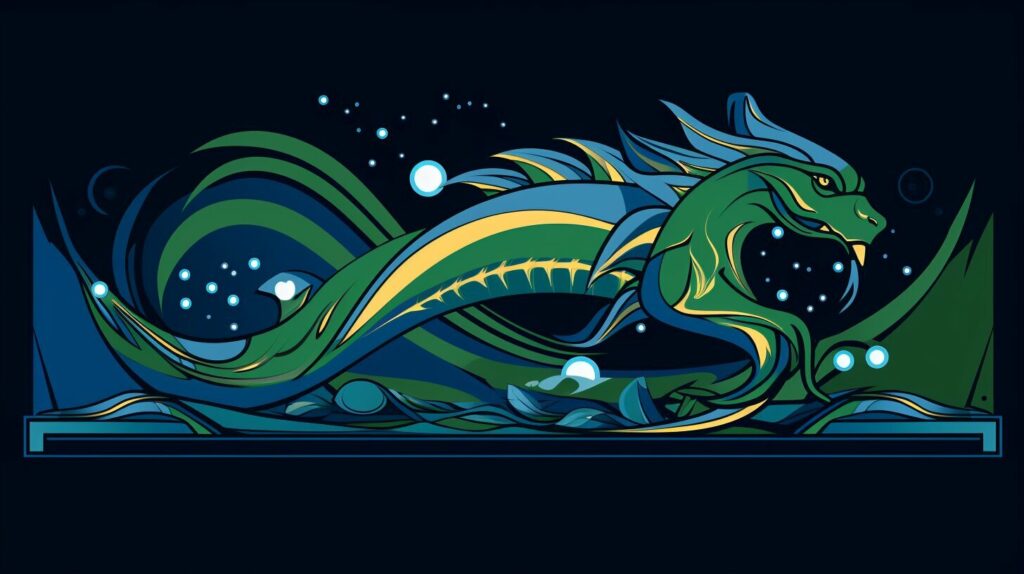 |
| The Amon-Ra | Jan 8 – Jan 21, Feb 1 – Feb 11 | 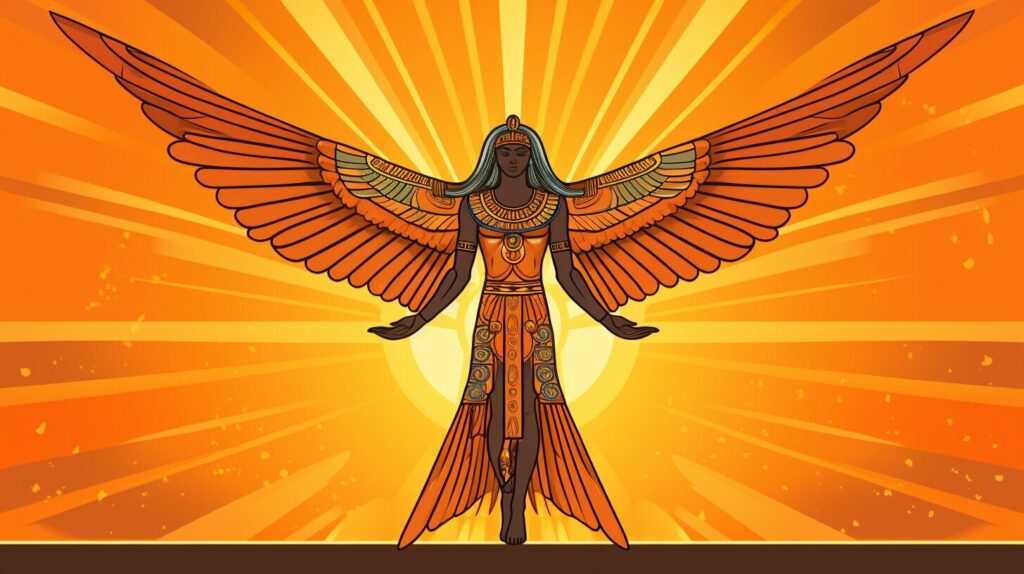 |
| The Mut | Jan 22 – Jan 31, Sep 8 – Sep 22 | 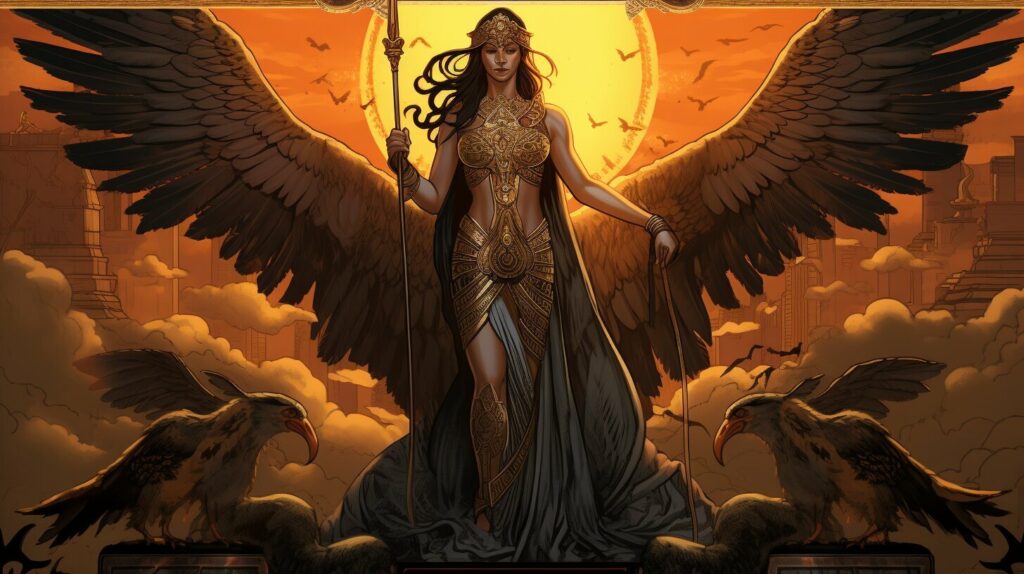 |
| The Geb | Feb 12 – Feb 29, Aug 20 – Aug 31 | 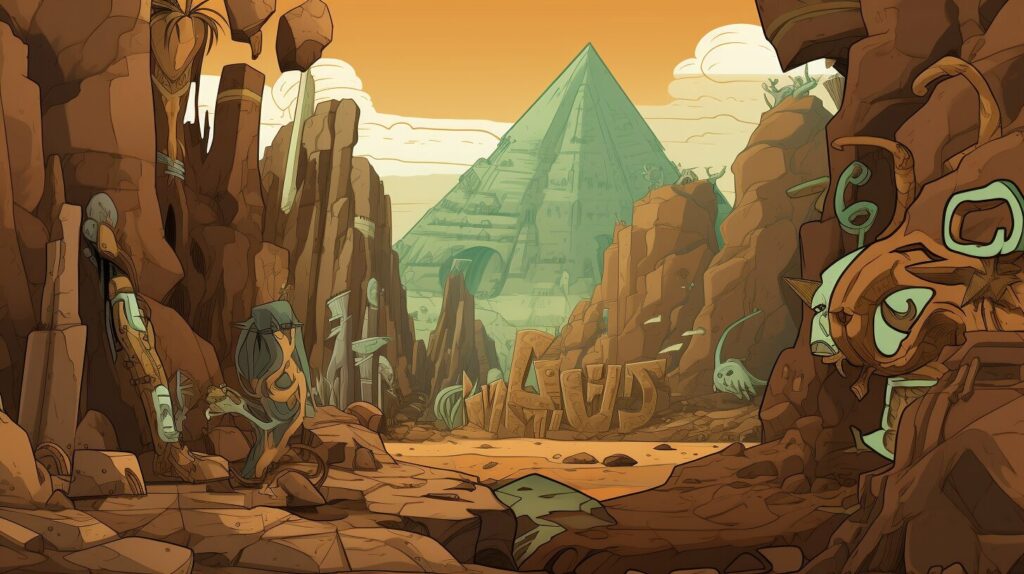 |
| The Osiris | Mar 1 – Mar 10, Nov 27 – Dec 18 | 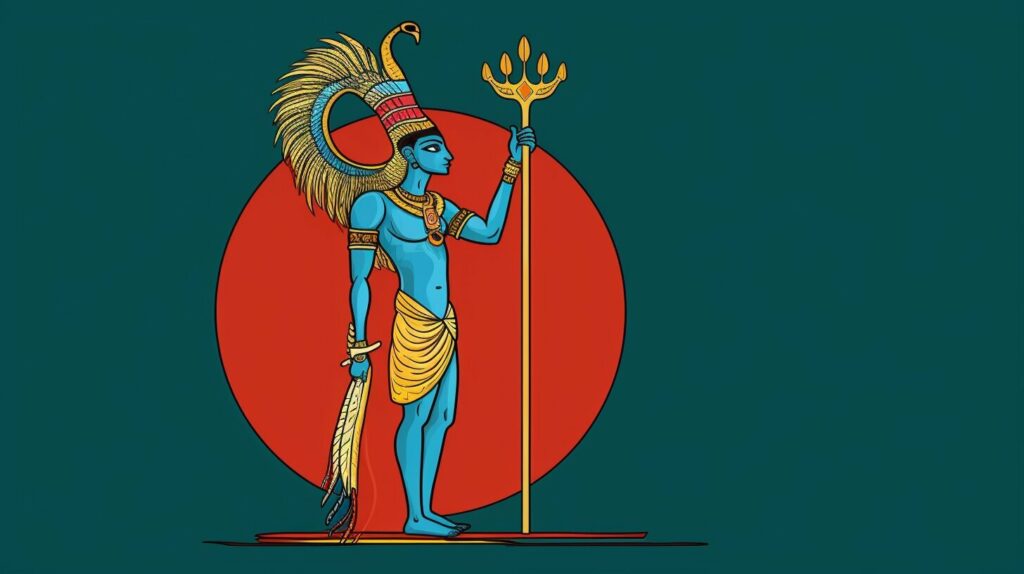 |
For example, those born under the sign of the Nile are believed to be creative, passionate, and independent, much like the unpredictable river they are associated with. Those born under the sign of Osiris, on the other hand, are thought to be natural leaders with a strong sense of justice and morality, similar to the god of the afterlife.
By understanding the symbolism and traits associated with each Egyptian zodiac sign, we can gain a deeper insight into our own personalities and those of others.
The Importance of the Egyptian Zodiac
The ancient Egyptians believed that the alignment of the stars and planets at the time of a person’s birth could have a significant impact on their life path. By understanding their Egyptian zodiac sign, individuals could gain insight into their strengths and weaknesses and make informed decisions about their personal and professional lives.
Today, many people still turn to Egyptian astrology for guidance and inspiration, drawn to its unique blend of symbols, mythology, and wisdom. By exploring the intricate details of the Egyptian zodiac signs, we can deepen our understanding of ourselves and the world around us.
Decoding Your Egyptian Horoscope
Now that you know your Egyptian zodiac sign, it’s time to decode your Egyptian horoscope. The ancient Egyptians believed that a person’s fate was determined by the position of the stars at the time of their birth. The goddess Nut, who was believed to hold up the sky, was also the goddess of the stars and was considered the mother of all Egyptian zodiac signs.
As with other astrological systems, Egyptian horoscopes also take into account the elements of the earth, air, water, and fire. Each sign is associated with one of these four elements, which further influences their personality traits and characteristics.
Refer to the Egyptian astrology chart to find your zodiac sign and its corresponding symbol. Then, use that symbol to find your place within the chart and determine which element your sign is associated with.
As you read your horoscope, pay attention to the unique traits and characteristics of your zodiac sign. Your horoscope may provide insights into your strengths, weaknesses, and potential life path based on your birth date and zodiac sign.
The ancient Egyptians believed that by understanding the movements of the stars and their influence on our lives, we could gain a deeper understanding of ourselves and our place in the universe. Embrace this wisdom and use it to unlock the secrets of your Egyptian horoscope.
The Intricate Egyptian Astrology Chart
The Egyptian astrology chart is a complex and multi-layered system that combines elements from astronomy, numerology, and mythology. It provides a detailed and comprehensive understanding of an individual’s personality, life path, and destiny based on their zodiac sign and birth date.
The chart consists of twelve houses, each representing a different area of life, such as love, career, and health. Each house is associated with a specific zodiac sign and ruled by a particular planet or deity. The placement of celestial bodies in each house can provide insights into an individual’s strengths, weaknesses, and potential challenges.
One of the unique features of the Egyptian astrology chart is the use of decans, which are subdivisions of each zodiac sign. Each decan is associated with a different deity and provides further insight into an individual’s personality and destiny.
For example, if someone is born under the sign of Anubis, their chart would indicate which of the twelve houses Anubis rules, as well as the placement of other celestial bodies in that house. It would also indicate the decan associated with their birth date and the corresponding deity, which would provide additional information about their personality and destiny.
The symbols used in the Egyptian astrology chart are rich in meaning and symbolism. They include images of deities, animals, and natural elements that represent different aspects of the human experience. Understanding these symbols is key to unlocking the deeper wisdom and insights of the Egyptian astrological system.
Interpreting the Egyptian Astrology Chart
Interpreting the Egyptian astrology chart requires a deep understanding of the symbolism and mythology of ancient Egypt. It also requires a knowledge of astronomy and mathematics, as the chart is based on precise calculations of celestial movements.
However, with the help of a skilled Egyptian astrologer, anyone can gain insight into their personality, strengths, and potential challenges based on their birth date and zodiac sign. The chart can also provide guidance on important life decisions and help individuals make the most of their potential.
Whether you are looking to explore your own personality and potential or simply fascinated by the ancient wisdom of Egyptian Astrology, the intricate and captivating world of the Egyptian astrology chart is sure to captivate and inspire.
Understanding Egyptian Astrology Symbols
One of the unique features of Egyptian astrology is the prominent use of symbols throughout its system. Symbols such as animals, gods, and natural elements play a significant role in defining the personality traits and characteristics associated with each zodiac sign.
For example, the god Thoth is associated with the Egyptian zodiac sign of Thoth. People born under this sign are said to possess analytical and intellectual abilities, much like the god of knowledge and wisdom himself. Similarly, those born under the symbol of the sphinx are thought to be complex and enigmatic, much like the creature itself.
It is important to understand the significance of these symbols and their connection to the broader themes of ancient Egyptian culture. For instance, the crocodile symbol is associated with the Nile River and its powerful and life-giving qualities. In Egyptian mythology, the god Sobek was often depicted as a crocodile and was seen as a protector of fertility, power, and transformation.
By understanding the symbolism behind each zodiac sign, we can gain deeper insights into the personality traits and potential life paths associated with them. Additionally, we can gain a deeper appreciation for the rich and complex mythology that underlies the Egyptian astrological system.
“The Egyptian zodiac signs are rich in symbolism, offering us a glimpse into the intricate mythology and culture of ancient Egypt.”
The use of symbols in Egyptian astrology is not limited to just the zodiac signs themselves. The Egyptian astrology chart is also full of symbolism, drawing on elements from astronomy, numerology, and mythology. By decoding these symbols, we can understand the deeper connections between celestial bodies and the human experience.
Interpreting Egyptian Astrology Symbols
Interpreting Egyptian astrology symbols can be a complex and ongoing process. It is important to approach the symbols with an open and curious mind, allowing the meanings to reveal themselves gradually over time.
One way to begin interpreting symbols is to research the mythology and cultural context behind them. Understanding the origins of the symbols can help us to understand their meanings and how they relate to the broader themes of Egyptian astrology.
Another helpful technique is to engage in meditation or visualization exercises, exploring the symbols and their meanings through introspection and imagination. By developing an intuitive connection to the symbols, we can gain a deeper understanding of their significance in our lives.
Whether as a tool for personal growth or as a way to connect with the rich history and culture of ancient Egypt, the symbols of Egyptian astrology offer a wealth of wisdom and insight to those who seek it.
The Influence of Egyptian Astrology on Daily Life
While Egyptian astrology was used primarily for divination and understanding one’s place in the cosmos, it also had a significant impact on daily life in ancient Egypt. The ancient Egyptians used the movements of the stars and planets to determine the right time for various activities, including planting crops, building structures, and embarking on journeys. They believed that these celestial movements could affect the outcome of these activities, and so they took care to align their actions with the stars.
Additionally, ancient Egyptian religion was closely intertwined with astrology. Many of the gods and goddesses were associated with celestial bodies, and so astrology played a role in religious ceremonies and rituals. For example, the goddess Isis was associated with Sirius, the brightest star in the night sky, and so the rising of Sirius in the sky was considered a significant event that was celebrated with festivals and offerings.
Personal relationships were also influenced by Egyptian astrology. The ancient Egyptians believed that the zodiac signs of two individuals could affect their compatibility and the success of their relationship. They used astrology to determine the best matches for marriage and to predict the outcome of romantic relationships.
Furthermore, Egyptian astrology played a role in decision-making processes for individuals and society as a whole. Kings and pharaohs relied on astrologers for guidance on matters of war, diplomacy, and governance, believing that the alignment of the stars could reveal the best course of action.
Although we may not rely on Egyptian astrology for daily guidance in the modern world, its impact can still be felt. Many people find inspiration and guidance in the ancient wisdom of this astrological system, using it as a tool for personal growth and self-discovery. Its symbols and philosophies continue to captivate and inspire us today, just as they did in ancient Egypt.
Egyptian Astrology and Personal Growth
Understanding your Egyptian zodiac sign can provide guidance on your journey of personal growth and self-discovery. Each sign has unique strengths and weaknesses that can be explored to maximize personal potential. The ancient Egyptians believed that each individual had a purpose and that discovering that purpose was the key to a fulfilling life.
For example, if your Egyptian zodiac sign is the cat, you possess qualities such as independence, intuition, and intelligence. These traits can be harnessed to overcome challenges and achieve personal success. Understanding your weaknesses, such as a tendency towards impatience or a lack of flexibility, can also provide insight into areas for personal growth.
Exploring your Egyptian horoscope can also provide guidance on your life path and potential career choices. For instance, if your sign is associated with the god Thoth, who presided over knowledge, writing, and communication, you may find fulfillment in a career in education, journalism, or public speaking.
Through the wisdom of Egyptian astrology, we can gain a deeper understanding of ourselves and our place in the world. By embracing the unique qualities of our Egyptian zodiac sign, we can unlock our full potential and achieve personal growth and fulfillment.
Egyptian Astrology and Relationships
As we explored in previous sections, ancient Egyptians believed that celestial bodies had a profound influence on human life and relationships. Understanding the dynamics between different Egyptian zodiac signs can provide insights into building harmonious connections and overcoming challenges.
For example, those born under the sign of Anubis (associated with the jackal) are said to be analytical and detail-oriented, while those born under the sign of Bastet (associated with the cat) are believed to be independent and adventurous. A relationship between these two signs may require compromise and understanding of each other’s strengths and weaknesses.
Similarly, the sign of Horus (associated with the falcon) is characterized by leadership and ambition, while the sign of Thoth (associated with the ibis) is associated with intelligence and creativity. These signs may complement each other well in a professional or personal partnership.
By understanding the nuances of Egyptian astrology, we can gain deeper insights into our own personalities and those of our loved ones. These insights can help us navigate relationships with greater empathy and understanding, leading to more fulfilling connections and personal growth.
Egyptian Astrology in Modern Context
While ancient Egyptian astrology may have originated thousands of years ago, it still holds relevance in modern times. Many people find that the wisdom and symbolism of this astrological system deeply resonates with them and offers valuable insights into their lives.
Today, there are numerous resources available for those seeking to explore Egyptian Astrology further. From books to online courses, individuals can learn about their Egyptian zodiac sign, decode their horoscope, and gain a deeper understanding of this ancient wisdom.
Furthermore, a growing number of practitioners are incorporating Egyptian Astrology into their work, offering readings and guidance based on this unique astrological system. Whether applied to personal growth or relationships, Egyptian Astrology offers a fresh perspective on the human experience.
As our world continues to evolve, the teachings of Egyptian Astrology provide a timeless reminder of our connection to the cosmos. By embracing the wisdom of this ancient system, we can gain a deeper understanding of ourselves and our place in the universe.
“By embracing the wisdom of this ancient system, we can gain a deeper understanding of ourselves and our place in the universe.”
Exploring Egyptian Astrology Practitioners
As with any ancient system of knowledge, Egyptian astrology was often interpreted and practiced by specialized individuals known as astrologers or priests. These practitioners would use their knowledge of celestial movements, numerology, and mythology to provide guidance and assistance to individuals and the society as a whole.
Astrological observations were a significant aspect of ancient Egyptian life, and the practice of astrology was closely intertwined with religion and spirituality. The astrologers were often priests and priestesses who were highly respected for their understanding of the cosmos and their ability to interpret its messages.
Many of the surviving texts and artifacts from ancient Egypt contain astrological references, and it is clear that the practice was deeply embedded in the culture. For example, the famous temple at Dendera includes a Zodiac ceiling that showcases the Egyptian zodiac signs and their associated deities.
One of the most well-known practitioners of Egyptian astrology was the priest Petosiris, who lived during the Ptolemaic period. He was an expert in astrology, and his books on the subject were widely read and respected. Petosiris believed that astrology was a tool for understanding the divine nature of the universe and that it could provide insights into the fate and destiny of individuals.
The role of the astrologer in ancient Egypt was not limited to personal guidance. Astrology was used to make important decisions about events such as the timing of harvests and the construction of buildings. Even the Pharaohs themselves were subject to astrological influence, with their reigns often being determined by the alignment of the stars at their birth.
While the practice of Egyptian astrology may have declined over time, its influence can still be felt in modern-day astrology and other forms of divination. The work of ancient practitioners like Petosiris has helped to preserve this fascinating system of knowledge, ensuring that it will continue to captivate and inspire people for generations to come.
Unveiling the Mysteries of Egyptian Astrology
As we delve deeper into the fascinating world of Egyptian Astrology, we begin to uncover the intricate details and hidden symbolism that make this ancient system so captivating. At its core, Egyptian astrology is a complex blend of astronomy, numerology, mythology, and spirituality, each element interwoven to create a rich tapestry of knowledge and insight.
One of the most intriguing aspects of Egyptian astrology is its use of symbols, which are drawn from the natural world, gods, and mythology. These symbols are not simply decorative, but are imbued with deep meaning and significance, representing the forces and energies that shape our lives.
The Egyptian astrology chart is another key element of this astrological system, serving as a visual representation of the cosmos and its influence on our lives. Drawing on ancient astronomical observations and numerical calculations, the chart provides a framework for interpreting celestial movements and their impact on human experience.
Practitioners of Egyptian astrology were highly regarded in ancient Egypt, sought after for their insights and guidance in matters ranging from personal relationships to political decisions. These practitioners often combined astrology with other forms of divination, such as reading bird entrails or interpreting dreams, to provide a more complete understanding of a person’s fate or fortune.
Today, the study and practice of Egyptian astrology continue to captivate and inspire people around the world. By exploring its mysteries and symbolism, we can gain a deeper understanding of ourselves and our place in the cosmos.
Whether we use it for personal growth, understanding relationships, or simply as a tool for enriching our lives, Egyptian astrology offers a unique perspective on the human experience. So embrace this ancient wisdom, and let it guide you on your journey of self-discovery and enlightenment.
Conclusion
In conclusion, Egyptian Astrology offers a fascinating perspective on the cosmos and our place in it. Through the exploration of ancient wisdom and symbolism, we can gain insights into our personalities, strengths, and weaknesses. Additionally, we can apply this knowledge to enhance our personal growth and relationships with others.
Through the centuries, the study of Egyptian Astrology has continued to captivate and inspire people around the world. Its unique characteristics and symbolism set it apart from other astrological systems, offering a rich and complex system of understanding oneself and the universe.
So, dive into the world of Egyptian Astrology and unlock its secrets for yourself. Embrace the wisdom of ancient civilizations and use it to cultivate a deeper understanding of yourself and the world around you.
Explore Further
If you want to delve deeper into the mysteries of Egyptian Astrology, there are many resources available online and in print. You might consider seeking out the works of ancient Egyptian astrologers or modern practitioners who have continued to develop and study this fascinating system. The possibilities are endless, and the rewards are immeasurable.
FAQ
Q: What is Egyptian astrology?
A: Egyptian astrology is an ancient astrological system that originated in Egypt. It is based on the belief that celestial observations and the movements of celestial bodies can provide insights into human personality traits, behaviors, and life paths.
Q: How is Egyptian astrology different from other astrological systems?
A: Egyptian astrology has its own unique characteristics and symbolism that distinguish it from other astrological systems. It incorporates elements from astronomy, numerology, and mythology, creating a holistic approach to understanding the human experience.
Q: What are the Egyptian zodiac signs?
A: The Egyptian zodiac consists of twelve signs, each associated with a specific symbol and deity. These signs are: The Nile (Amon-Ra), Amon-Ra (Aries), Mut (Taurus), Geb (Gemini), Osiris (Cancer), Isis (Leo), Thoth (Virgo), Horus (Libra), Anubis (Scorpio), Seth (Sagittarius), Bastet (Capricorn), and Sekhmet (Aquarius).
Q: How can I interpret my Egyptian horoscope?
A: Your Egyptian horoscope can be interpreted based on your birth date and the corresponding Egyptian zodiac sign. Each sign has specific personality traits and characteristics associated with it, which can provide insights into your strengths, weaknesses, and potential life path.
Q: What does the Egyptian astrology chart consist of?
A: The Egyptian astrology chart combines elements from astronomy, numerology, and mythology. It includes various celestial bodies, symbols, and their placement in specific houses. The chart helps unravel the layers of symbolism and draw connections between celestial movements and human experiences.
Q: What do different symbols in Egyptian astrology represent?
A: Symbols used in Egyptian astrology, such as animals, gods, and natural elements, carry deep significance. They represent specific qualities, energies, and archetypes that play a role in shaping the astrological system. Understanding these symbols can provide deeper insights into the meanings behind Egyptian astrology.
Q: How did Egyptian astrology influence daily life in ancient Egypt?
A: Egyptian astrology had a significant influence on various aspects of ancient Egyptian society. It impacted religious beliefs, personal relationships, and decision-making processes. The ancient Egyptians believed that celestial movements affected human lives and sought guidance from astrologers in making important decisions.
Q: How can I apply Egyptian astrology to personal growth?
A: Egyptian astrology can be applied to personal growth and self-discovery. By understanding your Egyptian zodiac sign and its associated characteristics, you can gain insights into your strengths and weaknesses. This knowledge can guide you in overcoming challenges and maximizing your personal potential.
Q: Can Egyptian astrology help in understanding relationships?
A: Yes, Egyptian astrology can enhance our understanding of relationships and compatibility. By exploring the dynamics between different Egyptian zodiac signs, you can gain insights into how different personalities interact and form harmonious connections.
Q: Is Egyptian astrology still relevant in the modern world?
A: Yes, Egyptian astrology has found its place in the modern world. There has been a revival of interest in this ancient astrological system as people seek alternative perspectives on astrology. The wisdom and symbolism of Egyptian astrology continue to captivate and inspire individuals today.
Q: What were the practices and rituals of Egyptian astrologers?
A: Egyptian astrologers interpreted celestial movements to provide guidance to individuals and the society as a whole. Their practices involved observing and recording celestial events, analyzing charts, and performing rituals to connect with celestial energies. These practices played a crucial role in the interpretation of Egyptian astrology.
Q: What are the lesser-known aspects of Egyptian astrology?
A: Egyptian astrology holds many lesser-known aspects that delve deeper into its symbolism, rituals, and philosophies. Exploring these aspects can unveil hidden meanings and profound wisdom within the system. It opens up a world of mystery and deep understanding of the human connection to the cosmos.
- Unveiling the Truth: Are Scorpio and Pisces Soulmates? - January 13, 2024
- Understanding What a Pisces Man Dislikes in a Woman - January 12, 2024
- Unveiling Artists with Pisces Moon: Astrology Meets Artistry - January 11, 2024
